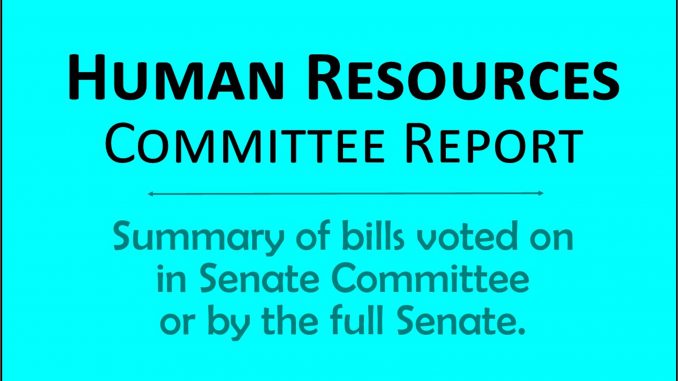
HF 2285 – Ground Emergency Medical Transportation;
SF 2309 – Dual eligible hospice payments;
HF 2356 – Primary care agreements;
HF 2449 – Department on Aging substitute decision maker name change;
HF 2451 – Department on Aging policy bill;
HF 2456 – Mental health complex needs;
HF 2414 – Child support medical support;
HF 2427 – Free clinics access to SING;
HF 2444 – Mandatory child abuse reporters;
HF 2445 – State hospital billing.
FLOOR ACTION:
HF 2285 addresses Ground Emergency Medical Transportation (GEMT). The bill allows Medicaid providers to track actual costs of ground emergency medical transportation and use the unreimbursed portion as the state match to draw down federal funds without additional state appropriations. The extra funds would provide supplemental payments to the providers of the GEMT service.
[3/19: 47-0 (Excused: Sinclair, Zumbach; Vacant: Dix)]
SF 2309 deals with reimbursements for dually eligible hospice patients. Payment will go directly to the nursing facility without passing through the hospice agency.
[3/21: 49-0 (Vacant: Dix)]
HF 2356 addresses Direct Primary Care Agreements. Also known as concierge medicine, individuals can contract with health care providers to get a certain set of primary care services for a monthly fee.
[3/21: 47-2 (No: Bolkcom, Quirmbach; Vacant: Dix)]
HF 2449, a Department of Aging code clean-up bill, changes the name of the Office of Substitute Decision Maker to the Office of Public Guardian, and clarifies that local offices may use their own attorney if they wish.
[3/21: 49-0 (Vacant: Dix)]
HF 2451 clarifies programs within the Department of Aging, adds flexibility to distribution of state funds to the Area Agencies on Aging by changing “formula” to “method,” and adds language conforming to federal laws.
[3/21: 49-0 (Vacant: Dix)]
HF 2456 addresses mental health reform based on the Complex Needs Workgroup recommendations. The bill allows disclosure of mental illness from mental health professionals to law enforcement; updates the commitment laws and process; allows for commitment hearings via video conferencing; allows contracting with a transportation agency for secure transportation of patients; changes Core Plus services to Core Services that are required; requires regions to provide start-up costs; directs Regions to develop 22 Assertive Community Treatment teams, six Access Centers, Intensive Residential Service Homes and a 24-hour crisis hotline; requires a review of the commitment processes; requires a report on the role of tertiary care psychiatric hospitals; and requires a fiscal viability committee in 2018.
[3/21: 49-0 (Vacant: Dix)]
COMMITTEE ACTION
HF 2414 deals with medical support obligations (in child support cases). The bill aligns Child Support Recovery code sections with federal law updates in January 2017. It defines cash medical support, health care coverage and public coverage. New regulations allow public coverage, such as hawki or Medicaid, to count toward medical support obligations. This should cause less disruption for children and their families.
[3/15: short form (Excused: Chapman, Greene, C Johnson)]
HF 2427 allows the Free Clinics of Iowa to electronically access the SING (background check) system. Currently, they have access to the data but part of the process is on paper and can take one to two months sometimes, causing the volunteer health care providers to lose volunteer providers.
[3/15: short form (Excused: Chapman, Greene)]
HF 2444 aligns Iowa Code to federal law. It adds to mandatory child abuse providers an employee, operator, owner or other person at a children’s residential facility (chapter 237C). A person who refuses a background check cannot be involved with child care.
[3/15: short form (Excused: Chapman, Greene)]
HF 2445 allows bills for services provided at a state hospital to be billed directly to the Mental Health and Disability Services region instead of the county auditor, making the billing process more efficient. The bill also eliminates an outdated term, “homemaker-home health aide.” An amendment adds the language from SF 2369, relating to “county of residence.”
[3/15: short form (Excused: Chapman, Greene)]
